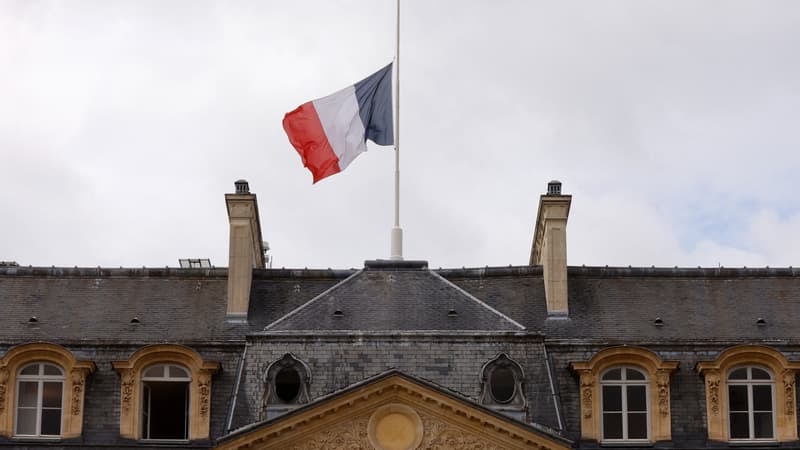At half mast and some negatives. The day after Queen Elizabeth II’s death, Emmanuel Macron on Friday proposed lowering flags from public buildings in her memory. Prime Minister Élisabeth Borne then sent a letter to France’s mayors’ association to make the request official. But several local elected officials, in Bourges and Faches-Thumesnil in the north, refused to do so, deeming the decision inappropriate for a foreign sovereign. But what does the law say about it?
An obligation in case of national mourning
Specifically, not much. A decree of September 13, 1989 regarding military honors requires that flags be lowered at half-staff in the event of the death of the President of the Republic, but only for military buildings. If the flags of public buildings (town halls, schools, etc.) are also usually lowered in these circumstances, they are not required by law to do so. This had been the case when Jacques Chirac died in 2019.
Apart from this very particular case, the flags must also be lowered during the days of national mourning, an unusual decision, made by decree of the President of the Republic.
Such days were introduced only nine times during the Fifth Republic: during the death of the presidents of the French Republic or during serious attacks in France or abroad, after September 11, 2001 or November 13, 2015.
A “very symbolic” act
For the rest, nothing is legally foreseen. But the decision to lower the flags was made ad hoc by the Prime Minister during other events considered significant. This was particularly the case with the death of former US President Ronald Reagan in 2004 or that of Nelson Mandela, former South African president and figure in the fight against apartheid in 2013.
In general, the half-staff of flags remains a “very symbolic” act at first, considers the constitutional lawyer Louis Le Foyer de Costil. “It’s like making a toast,” he says.
Can a local elected official refuse to follow the recommendation of the head of government on this issue? “A priori, a mayor is free to choose whether or not to put a flag at half-staff” in the name of the “principle of free administration”, indicates the lawyer.
“The council is a municipal building” and not a national one, he recalls, and by lowering a flag to a foreign head of state, an elected official “is not acting a priori on behalf of the state.”
Despite this, elected officials overwhelmingly agree to lower their flags in the event of a major national or international event due to their “exceptional side.”
Little chance of penalties
If an elected representative refuses to follow the advice of the head of government, there is very little risk of legal consequences. The head of government can resort to a referral from the prefecture and ask a judge to rule urgently on the issue if he finds a “legal basis” to support his action. In this case, the refusal to fly a flag at half-staff could be suspended.
But in practice, this case is still highly unlikely. Disciplinary procedures aimed at elected officials, such as suspension, are “very rare”, according to the lawyer. Above all because in the case of lowering the flags, the decision is actually “very political” and that, according to him, “the judges do not like to get involved” in general. Therefore, little chance that the mayors of Bourges and Faches-Thumesnil will incur any sanctions.
Following the death of Pope John Paul II in 2005, many elected officials, associations and unions criticized the lowering of flags on public buildings in the name of a strict separation of church and state. The Ministry of the Interior had responded by highlighting a “republican use”.
Last March, the Community of Corsica had instead chosen to lower flags after the death of Yvan Colonna on its own initiative. The decision was criticized, but no sanctions were taken against him or the elected officials who had implemented this request.
Source: BFM TV


